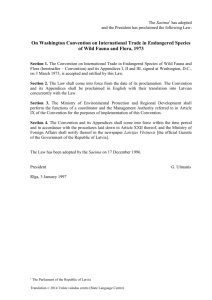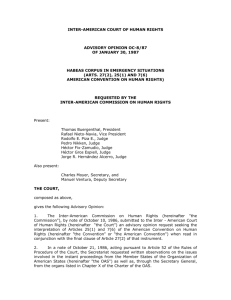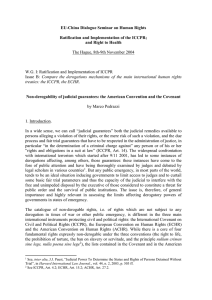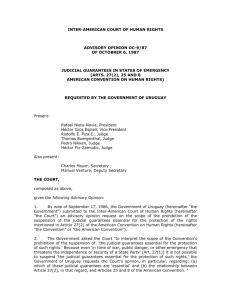INFORME RELATIVO A LOS MÉRITOS DE LA DEMANDA
advertisement
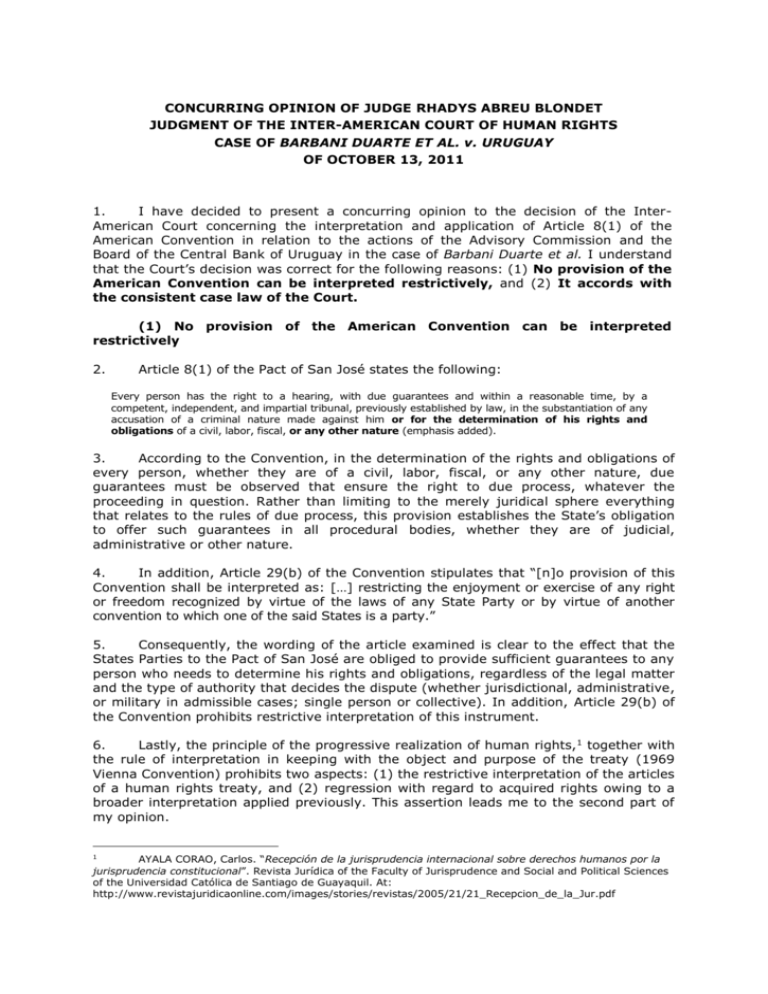
CONCURRING OPINION OF JUDGE RHADYS ABREU BLONDET JUDGMENT OF THE INTER-AMERICAN COURT OF HUMAN RIGHTS CASE OF BARBANI DUARTE ET AL. v. URUGUAY OF OCTOBER 13, 2011 1. I have decided to present a concurring opinion to the decision of the InterAmerican Court concerning the interpretation and application of Article 8(1) of the American Convention in relation to the actions of the Advisory Commission and the Board of the Central Bank of Uruguay in the case of Barbani Duarte et al. I understand that the Court’s decision was correct for the following reasons: (1) No provision of the American Convention can be interpreted restrictively, and (2) It accords with the consistent case law of the Court. (1) No provision of the American Convention can be interpreted restrictively 2. Article 8(1) of the Pact of San José states the following: Every person has the right to a hearing, with due guarantees and within a reasonable time, by a competent, independent, and impartial tribunal, previously established by law, in the substantiation of any accusation of a criminal nature made against him or for the determination of his rights and obligations of a civil, labor, fiscal, or any other nature (emphasis added). 3. According to the Convention, in the determination of the rights and obligations of every person, whether they are of a civil, labor, fiscal, or any other nature, due guarantees must be observed that ensure the right to due process, whatever the proceeding in question. Rather than limiting to the merely juridical sphere everything that relates to the rules of due process, this provision establishes the State’s obligation to offer such guarantees in all procedural bodies, whether they are of judicial, administrative or other nature. 4. In addition, Article 29(b) of the Convention stipulates that “[n]o provision of this Convention shall be interpreted as: […] restricting the enjoyment or exercise of any right or freedom recognized by virtue of the laws of any State Party or by virtue of another convention to which one of the said States is a party.” 5. Consequently, the wording of the article examined is clear to the effect that the States Parties to the Pact of San José are obliged to provide sufficient guarantees to any person who needs to determine his rights and obligations, regardless of the legal matter and the type of authority that decides the dispute (whether jurisdictional, administrative, or military in admissible cases; single person or collective). In addition, Article 29(b) of the Convention prohibits restrictive interpretation of this instrument. 6. Lastly, the principle of the progressive realization of human rights, 1 together with the rule of interpretation in keeping with the object and purpose of the treaty (1969 Vienna Convention) prohibits two aspects: (1) the restrictive interpretation of the articles of a human rights treaty, and (2) regression with regard to acquired rights owing to a broader interpretation applied previously. This assertion leads me to the second part of my opinion. AYALA CORAO, Carlos. “Recepción de la jurisprudencia internacional sobre derechos humanos por la jurisprudencia constitucional”. Revista Jurídica of the Faculty of Jurisprudence and Social and Political Sciences of the Universidad Católica de Santiago de Guayaquil. At: http://www.revistajuridicaonline.com/images/stories/revistas/2005/21/21_Recepcion_de_la_Jur.pdf 1 (2) The Court has merely ratified its consistent case law 7. Since the cases of the Constitutional Court v. Peru and Baena Ricardo et al. v. Panama, both in 2001, and up until the case of Vélez Loor v. Panama in 2010, ranging through cases such as Ivcher Bronstein v. Peru (2001), Yatama v. Nicaragua (2005), Sawhoyamaxa Indigenous Community v. Paraguay (2006), Claude Reyes et al. v. Chile (2006), Apitz Barbera et al. v. Venezuela (2008), and Escher et al. v. Brazil (2009), the Inter-American Court has reiterated that the Public Administration, in its different manifestations and dimensions, “is not excluded from complying with [the] obligation” to provide the interested party with “all the minimum guarantees that permit reaching just decisions.” “The minimum guarantees must be respected in administrative proceedings and in any other proceeding in which the decision may affect the rights of the individual.”2 8. In this regard, in the case of Baena Ricardo, the Inter-American Court considered that “[a]lthough Article 8 of the American Convention is entitled ‘Right to a Fair Trial [Note: in Spanish: ‘Garantias Judiciales], its application is not limited strictly to judicial remedies, ‘but [to the] whole series of requirements that must be observed in the procedural bodies’ to ensure that the individual is able to defend his rights adequately in any type of act of the State that could affect them. In other words, any act or omission of the State bodies within a proceeding, whether it be administrative, disciplinary or jurisdictional, must respect due process of law.”3 9. Similarly, in the case of Yatama with regard to Nicaragua, the Court indicated that “[a]ll the bodies that exercise functions of a jurisdictional nature have the obligation to adopt just decisions based on full respect for the guarantees of due process established in Article 8 of the American Convention.” In this regard, it interpreted Article 8(1) broadly, establishing that this article refers “to the right of everyone to be heard by a ‘competent judge or court’ ‘for the ‘determination of his rights.’” In addition, the Court clarified that this expression refers to any “public authority,” whether administrative, legislative or judicial, which, by its decisions, “may affect the determination of [the] rights” of the individual.4 10. On this basis, the application of Article 8(1) to decisions that determine rights and obligations of the individual in the administrative sphere is a fait accompli in the current status of the Court’s case law, and Article 29(b) of the Pact prohibits a regressive interpretation. 11. It would be more interesting to discuss whether, based on the interpretation already made by the Court, Article 8(1) of the Convention would be applicable to the decisions issued by a Council of Elders or the equivalent authority in an indigenous community, taking into account that the latter’s source of law, although it would not be the State, is, to a certain extent, sovereign, and its authority is recognized by some States Parties to the Convention for its members, provided that those decisions do not run counter to the norms of the State. Case of Baena Ricardo et al. v. Panama. Merits, reparations and costs. Judgment of February 2, 2001. Series C No. 72, para. 127. 2 3 Case of Baena Ricardo et al., supra nota 2, para. 124. Case of Yatama v. Nicaragua. Preliminary objections, merits, reparations and costs. Judgment of June 23, 2005. Series C No. 127, para. 149. 4 2 Rhadys Abreu Blondet Judge Pablo Saavedra Alessandri Secretary 3



